《新编大学实用英语英语教程》1 教案
新编大学实用英语1教案

教学目标:1. 让学生掌握基本的英语发音和语调;2. 培养学生的听、说、读、写四项基本技能;3. 提高学生的英语实际应用能力;4. 培养学生的自主学习能力和团队合作精神。
教学对象:大学一年级新生教学课时:2课时教学准备:1. 教材:《新编大学实用英语1》;2. 多媒体课件;3. 英语发音录音;4. 听力材料;5. 课堂活动材料。
教学过程:第一课时一、导入1. 播放英语歌曲,活跃课堂气氛;2. 介绍课程目标和教学安排。
二、热身活动1. 让学生进行自我介绍,用英语表达;2. 进行简单的英语问候和交流。
三、英语发音和语调1. 讲解英语元音和辅音的发音规则;2. 播放英语发音录音,让学生跟读;3. 进行小组练习,纠正发音错误。
四、听力训练1. 播放英语听力材料,让学生回答问题;2. 讲解听力技巧,提高学生的听力理解能力。
五、阅读训练1. 分发教材中的课文,让学生阅读;2. 提出问题,检查学生的阅读理解能力;3. 进行小组讨论,分享阅读心得。
六、总结与作业1. 总结本节课的学习内容;2. 布置课后作业,包括听力、阅读和写作练习。
第二课时一、复习与巩固1. 回顾上节课的学习内容;2. 进行听力、阅读和写作练习。
二、口语训练1. 让学生用英语进行简单的对话练习;2. 进行小组讨论,提高口语表达能力。
三、写作训练1. 讲解英语写作的基本技巧;2. 让学生根据教材中的范文进行写作练习;3. 进行小组互评,提高写作水平。
四、课堂活动1. 组织学生进行角色扮演,提高英语实际应用能力;2. 进行小组竞赛,激发学生的学习兴趣。
五、总结与作业1. 总结本节课的学习内容;2. 布置课后作业,包括听力、阅读和写作练习。
教学反思:1. 关注学生的学习进度,及时调整教学策略;2. 鼓励学生积极参与课堂活动,提高他们的英语实际应用能力;3. 注重培养学生的自主学习能力和团队合作精神,为他们的英语学习奠定坚实基础。
新编大学英语1教案

教学目标:1. 通过本单元的学习,使学生掌握相关词汇和语法知识,提高英语听说读写能力。
2. 培养学生运用英语进行交流的能力,增强学生的跨文化交际意识。
3. 帮助学生了解并关注社会热点话题,提高学生的思辨能力。
教学内容:1. 词汇:本单元重点词汇包括:environmental protection、energy-saving、public transportation等。
2. 语法:现在进行时态的构成和用法。
3. 听力:听懂日常生活中的对话,了解不同文化背景下的交流方式。
4. 阅读:阅读关于环境保护的文章,提高阅读速度和理解能力。
5. 写作:撰写一篇关于环境保护的短文,锻炼写作能力。
教学过程:一、导入1. 用PPT展示本单元的词汇和语法,让学生初步了解学习内容。
2. 引导学生思考:环境保护对于我们每个人来说意味着什么?二、词汇教学1. 教师带领学生朗读本单元的词汇,让学生熟悉发音和拼写。
2. 通过例句讲解词汇在句子中的用法,让学生学会运用词汇。
3. 进行词汇练习,巩固所学词汇。
三、语法教学1. 教师讲解现在进行时态的构成和用法,通过例句让学生理解。
2. 学生进行语法练习,巩固所学语法知识。
四、听力教学1. 播放听力材料,让学生听懂对话内容。
2. 针对听力材料进行提问,检验学生对对话内容的理解。
3. 学生分组讨论,分享听力材料中的文化差异。
五、阅读教学1. 学生阅读关于环境保护的文章,了解文章大意。
2. 教师提问,引导学生深入理解文章内容。
3. 学生分组讨论,分享阅读心得。
六、写作教学1. 教师讲解写作要求,指导学生撰写关于环境保护的短文。
2. 学生进行写作练习,教师给予个别指导。
3. 学生展示写作成果,互相评价。
七、课堂小结1. 教师对本单元的学习内容进行总结,强调重点和难点。
2. 学生分享学习心得,提出疑问。
教学反思:1. 本节课的教学内容丰富,教学方法多样,有助于提高学生的英语综合能力。
2. 学生在课堂上的参与度较高,能够积极参与讨论和练习。
《新编大学实用英语英语教程》(林立总主编)第一册教案

教案课程名称大学英语1教案书写规范与要求一、以每次课为一个备课单元书写。
二、每一备课单元书写下列内容:1.周次、课次、授课时间、章节名称;2.简要说明:教学目的、重点、难点、教学方法和授课手段(包括与课程相关的上机和实验、课件制作等);3.教学主要内容(教案主体)及教学方法手段;4.作业内容。
注:其余授课电子版文件待本课程结束后,交教务处统一刻成光盘存档。
大学英语1 课程授课总体计划书厦门软件职业技术学院教案厦门软件职业技术学院教案厦门软件职业技术学院教案厦门软件职业技术学院教案5 We are surprised at his great __improvement__(improve) in English.Activity 5 Fill in the blanks with the proper form of the words and phrases given in the box.1We got tired of his _endless_ boring speech.2 _Chatting_with friends is a good way of relaxation.3 Our country is rich in natural_resources__.4 Upon arrival,the singer are surrounded by a lot of fans and reporters.5 Tom _spends a lot of time in playing computer games every day.6To my surprise,only a third of the students in my class are interested in skiing.7He seems so quiet,but _actually he likes talking.8These days all the college students are very busy,especially the seniors.9 I sent her a bunch of flowers as a (an) expression of gratitude.10 Our college offers an excellent art program .Step II Grammar代词(Pronouns)一代词的分类二代词的用法1 人称代词注意:(1)人称代词在比较分句中作主语,用主格;作宾语,用宾格,如:She works harder than I (do).她比我用功。
新编大学英语第一册教案

Unit 1 Personal Relationships1. Preparation (Period 1& 2)Background InformationAll of us are involved in personal relationships. Some of these are related to family, some with fellow students or workers, and others of a variety of types. Most of these are happy, positive relationships, but not all of them. To have a positive relationship a person must invest time and interest in the other persons with whom he is associated. We all understand that our feelings and interest in other persons depend somewhat on what we have in common. Good relationships are usually valued because people who have good relationships are happier and more fun to be with.1.1 What kinds of relationship are you involved everyday?Can you complete the pairs of words about personal relationships?parent —host —husband —boyfriend —teacher —clerk —doctor —driver —employer —buyer —writer —performer —lawyer —director —policeman —interviewer —Eg: twins, family, couple, cousin, sisters, colleagues, leaders and audiencesisters and brothers, lovers, friends, neighbors, colleagues, schoolmates, fellow workers,…Are they important for your daily life or study? Why? List one example and explain it.1.2 Of all the relationships, which one do you think is easier to be established at the beginning of your college life? Why?A StoryListen to a short story and complete the following sentences:1. The story took place at the time of ______________________________________.2. The relationship between the woman and the little boy is _________.3. The woman led the little boy into the store because ______________________________.4. The woman bought the boy______________________________.5. ―Are you God…‖ here means ____________.原文:They came back outside into the street and the woman said to the child, ―Now you can go home and have a very happy holiday.‖ The little boy looked up at her and asked, ―Are you God, Ma’am?‖ She smiled down at him and replied, ―No, son, I’m just one of his children.‖ The little boy then said, ―I knew you had to be a relative of God.‖Welcome to Our Group!Introducing Yourself to Your Group Members Locationprovince 省 city 市county 县town 镇village 村in the suburbs of 在…的郊区high/middle school 中学key high school 重点中学high school attached to附属中学Personalityfrank 坦率的honest 诚实的outgoing 外向的shy 胆怯的introverted 内向的enthusiastic 热情的Hobbiesstamp-collecting 集邮 sports 运动reading 阅读watching TV 看电视 drawing 绘画photography 摄影 calligraphy 书法traveling 旅游shopping 购物surfing the net 网上冲浪playing cards 打牌fishing 钓鱼like 喜欢be keen on 喜爱prefer 比较喜欢favorite 最爱dislike 不喜欢Discussion in Pairs1. What is your viewpoint of the interpersonal relationships nowadays?2. If you were the woman, what would you do? Try to explain it.3. In our life, some people are open while some others are reserved. Which type do you prefer? Why?Listen to a passage and answer questions:acquaintance 熟人intimate 亲密的harmonious 和谐的t olerate 容忍Questions :1. According to the passage, what is the word ―friend‖?It covers a wide range of meanings as a classmate, a nodding acquaintance, a coworker, etc. 2. Why does everyone need friendship?We need help from, and also give help to, others.3. Why do modern people attach more importance to friendship?As life is full of difficulties and conflict, we need friends to support and help us and give us warnings against danger.原文We Need FriendsThe word, ―friend‖, covers a wide range of meanings. It can be a nodding acquaintance, a classmate, a partner, a playmate, or an intimate colleague. Everyone needs friendship. No one can sail the ocean of life single-handed. We need help from, and also give help to, others. In modern times, people attach more importance to relationships and connections. As life is full of difficulties and conflict, we need friends to support and help us. Our friends give us warnings against danger. Our friends offer us advice with regard to how to deal with various situations.Proverbs and SayingsA friend in need is a friend indeed.A friend is best found in adversity.患难见真情。
大学英语第一单元教学设计方案

In ”TryingYourHand",become knowledgeable on how to write a business card and fill in a passport withone’spersonal information; review the basicsentencestructure。
2。Writing sentences and reviewing Grammar
15’
归纳
总结
通过本次课学习,学生掌握名片的书写格式,了解护照的内容结构.通过练习掌握常用的英语基本句型及用法。
3'
作业
布置
1.Page14Write and create,Page15Write and Translate
6. Say hello in different languages
7. Write a business card
语言能力目标:
1. Etiquette of meeting and introducing people
2. Etiquette of exchanging business cards
10’
知识
讲解
rmation Related to theReadingPassage
新编实用英语1(第四版)教学大纲
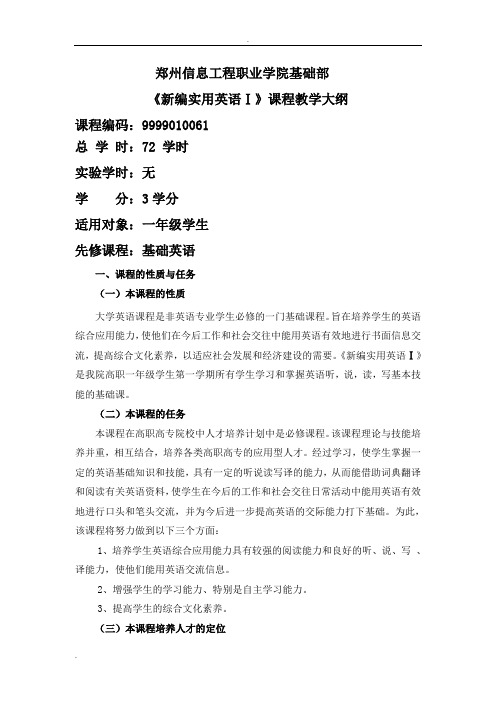
郑州信息工程职业学院基础部《新编实用英语Ⅰ》课程教学大纲课程编码:9999010061总学时:72 学时实验学时:无学分:3学分适用对象:一年级学生先修课程:基础英语一、课程的性质与任务(一)本课程的性质大学英语课程是非英语专业学生必修的一门基础课程。
旨在培养学生的英语综合应用能力,使他们在今后工作和社会交往中能用英语有效地进行书面信息交流,提高综合文化素养,以适应社会发展和经济建设的需要。
《新编实用英语Ⅰ》是我院高职一年级学生第一学期所有学生学习和掌握英语听,说,读,写基本技能的基础课。
(二)本课程的任务本课程在高职高专院校中人才培养计划中是必修课程。
该课程理论与技能培养并重,相互结合,培养各类高职高专的应用型人才。
经过学习,使学生掌握一定的英语基础知识和技能,具有一定的听说读写译的能力,从而能借助词典翻译和阅读有关英语资料,使学生在今后的工作和社会交往日常活动中能用英语有效地进行口头和笔头交流,并为今后进一步提高英语的交际能力打下基础。
为此,该课程将努力做到以下三个方面:1、培养学生英语综合应用能力具有较强的阅读能力和良好的听、说、写、译能力,使他们能用英语交流信息。
2、增强学生的学习能力、特别是自主学习能力。
3、提高学生的综合文化素养。
(三)本课程培养人才的定位该课程是我院各专业学生必修的一门公共基础课程,旨在培养学生的英语综合应用能力(听、说、读、写、译);培养学生使用英语处理日常和涉外业务活动能力。
使他们在今后工作中与社会交往中能用英语有效地进行信息交流,提高综合文化素养,以适应社会发展日益国际化的需要。
(四)本课程在人才培养过程中的作用经过本课程的学习,使学生扎实语音、语法、词汇和基本句型等语言基本功,强化并提高听、说、读、写、译的综合能力,提高学生就业竞争力。
二、课程的基本要求通过学习本课程,学生应该达到以下要求:1、词汇认知 2500 个英语单词(包括入学时要求掌握的 1000 个词) 以及由这些词构成的常用词组,对其中 1500个左右的单词能正确拼写,能进行英汉互译。
新编实用英语第一册教案
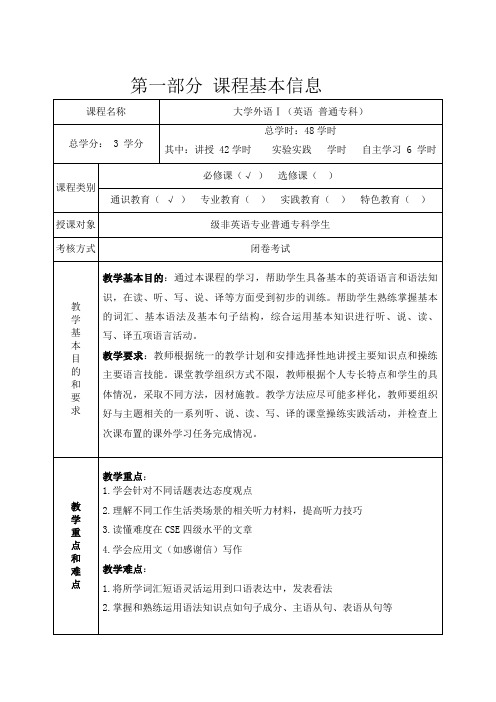
第一部分课程基本信息第二部分教学设计一、课程与教材分析(一)课程分析《大学英语》是高等教育的一个有机组成部分,是大学生的一门必修的基础课程。
大学英语教学是以英语语言知识与应用技能、学习策略和跨文化交际为主要内容;以外语教学理论为指导,并集多种教学模式和教学手段为一体的教学体系,旨在培养学生英语综合应用能力,特别是听说能力,使他们在今后工作和社会交往中能用英语有效地进行口头和书面的信息交流,同时增强其自主学习能力、提高综合文化素养,以适应我国经济发展和国际交流的需要。
(二)教材分析(突出针对课程需要,合理选择教材和教参)《新编实用英语》(第五版)系列教材国家“十三五”规划教材,是严格按照国家职业教育目标和要求精心设计的立体化公共外语教材,教材内容贴合日常交际和职场需求,在主题类别、语篇类型、语言知识、文化知识等方面均与《新课标》紧密对应,历经多年教学实践,得到了广大高职高专院校师生的充分认可。
教材立足“立德树人”根本教育任务,探索外语“课程思政”建设,注重中华优秀文化的表达,助力培养德才兼备、德智体美劳全面发展的人;注重培养学生的英语学科核心素养,助力学生形成关键能力和必备品格以及形成正确的世界观、人生观和价值观,努力将大英教材的思想价值渗透作用最大化,以美育人、以德润人,以文化人,潜移默化中引导学生坚定“四个自信”,润物无声中实现“育人育才”。
教材聚焦典型生活和职业场景,以富有生活化、职业性和时代性的选材,将英语技能放在职业场景中操练,注重对学生英语基本功和职业技能的全面培养,并创设“线上+ 线下”混合式外语教学生态,资源以立体化、多模态形式呈现,是比较适合我校学生实际的教材。
二、学生情况分析(一)学生基本情况本课程是面向我校非英语专业普通专科学生的公共必修课,所教大部分学生有较强的学习积极性、主动性和自觉性,具备比较基本的英语阅读和简单写作的能力,但是听力水平普遍较低,词汇量相对有限,在写作和翻译方面能力较为欠缺。
新编大学英语实用教程教案

教学目标:1. 让学生掌握基本的英语听说读写技能。
2. 培养学生的英语思维能力,提高英语综合素质。
3. 增强学生的英语实际应用能力,为未来的学习和工作打下基础。
教学重点:1. 英语基本语法和词汇。
2. 英语听说读写技能的培养。
3. 英语实际应用能力的提高。
教学难点:1. 学生对英语语法的理解和运用。
2. 学生在听说读写方面的实际操作。
3. 学生在实际应用中遇到的困难和问题。
教学过程:一、导入1. 教师用英语进行自我介绍,激发学生的学习兴趣。
2. 学生用英语进行自我介绍,锻炼口语表达能力。
二、新课导入1. 教师展示本节课的学习目标,让学生明确学习方向。
2. 学生根据学习目标,提出自己的学习疑问。
三、语法讲解1. 教师讲解本节课的语法知识点,如时态、语态、非谓语动词等。
2. 学生跟随教师一起练习语法,巩固所学知识。
四、词汇学习1. 教师讲解本节课的词汇,如重点单词、短语等。
2. 学生跟读、拼写、造句,加深对词汇的理解和记忆。
五、听说训练1. 教师播放听力材料,学生进行听力练习。
2. 学生分组进行口语对话,提高口语表达能力。
六、阅读理解1. 教师讲解阅读理解的方法和技巧。
2. 学生阅读课文,完成阅读理解题目。
七、写作训练1. 教师讲解写作的技巧和注意事项。
2. 学生根据教师提供的写作题目,进行写作练习。
八、课堂小结1. 教师对本节课的学习内容进行总结。
2. 学生回顾所学知识,巩固所学内容。
九、课后作业1. 完成课后阅读材料。
2. 完成课后练习题。
3. 准备下一节课的口语对话。
教学评价:1. 学生对语法知识的掌握程度。
2. 学生在听说读写方面的实际操作能力。
3. 学生对英语实际应用能力的提高。
教学反思:1. 教师根据学生的学习情况,调整教学内容和方法。
2. 注重培养学生的英语思维能力和实际应用能力。
3. 鼓励学生积极参与课堂活动,提高学习兴趣。
新编英语教程1第三版教学设计
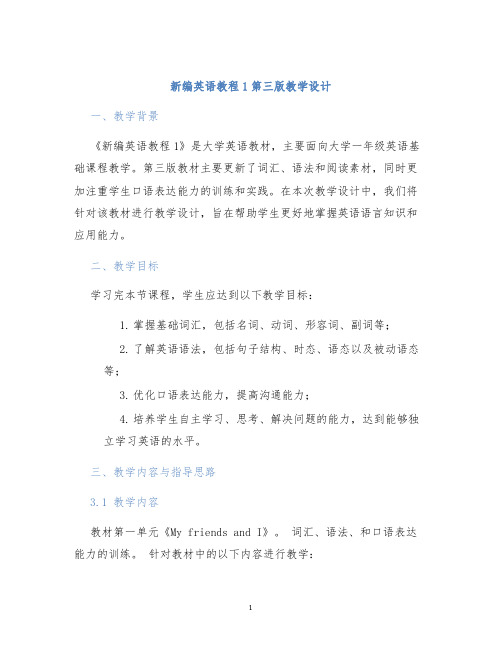
新编英语教程1第三版教学设计一、教学背景《新编英语教程1》是大学英语教材,主要面向大学一年级英语基础课程教学。
第三版教材主要更新了词汇、语法和阅读素材,同时更加注重学生口语表达能力的训练和实践。
在本次教学设计中,我们将针对该教材进行教学设计,旨在帮助学生更好地掌握英语语言知识和应用能力。
二、教学目标学习完本节课程,学生应达到以下教学目标:1.掌握基础词汇,包括名词、动词、形容词、副词等;2.了解英语语法,包括句子结构、时态、语态以及被动语态等;3.优化口语表达能力,提高沟通能力;4.培养学生自主学习、思考、解决问题的能力,达到能够独立学习英语的水平。
三、教学内容与指导思路3.1 教学内容教材第一单元《My friends and I》。
词汇、语法、和口语表达能力的训练。
针对教材中的以下内容进行教学:1.人称代词和物主代词的使用;2.简单时态(现在时、过去时以及将来时)的使用;3.动词的被动语态;4.多种句子结构的使用;5.常用的日常英语口语表达。
通过多种学习方式,全面提高学生英语语言综合素养和应用能力,达到英语语言沟通的基本要求。
3.2 指导思路1.提高学生的学习兴趣,增强学习主动性和积极性。
通过小组讨论、课堂问答、真实场景模拟等方式,让学生感知英语语言的巨大魅力,提高主动学习的意识。
2.基于学生的实际掌握水平,采用多种教学手段。
无论是针对词汇的阅读训练、语法知识的梳理与模拟训练,还是口语交际能力的提升,本次教学肯定有多种形式的练习活动。
3.系统性地传授英语语言知识,严格把关学习效果。
逐步推进解题思路,梳理重点难点知识体系,切实提高学生英语语言的全面分析及解决问题的能力。
三、教学过程3.1 教学方法采用多种教学方法:1.讲授;2.互动交流;3.问答;4.课外练习。
3.2 教学流程第一步:引入通过一些真实的英语场景让学生感受到英语语言实际应用的价值。
第二步:阅读理解通过阅读教材,让学生掌握重要词汇和英语语言的基础语法知识,并通过练习巩固记忆。
新编英语教程Unit1教案

新编英语教程Unit1教案Unit OneI. Lead-inMovie ClipWatch the following video and then do the exercise. You can find the interpretation of some words and phrases in "Word Bank".Book 6 Unit 1.mp4 (00:00 – 02:33)Script- See?- So this is where the tree went.- What?- Interesting.- What's so interesting?- These branches don't have a single leaf.- You know, I noticed that, too.- Jack. Look at the tree and say something.- Say what? What's so funny?- This is amazing. Don't you see?- Hey, you know, it almost seems like every time I say something, some of the ... Hello? Hel ...lo! I want my baby back, baby back, baby back. I want my baby back, baby back ribs. Shit!Hey, how are you doing this?- Me? I'm doing nothing. You and this tree are now connected.- Connected?- It seems like all your talking is making you sick.- Hey, my talking is not making me sick.- Oh, really? What happens when a tree loses all its leaves, Jack?- So what are you trying to say, Sinja?- It's obvious to me. The more you talk, the more leaves fall, the sicker you get.- The sicker I get? So what happens if all the leaves fall off the tree?- That usually means the tree is dead.- Hey, wait a second. Hold on a second. You're telling me that you think whatever happens to the tree happens to me? - Yes.- So I could die.- Yes, but you would die in the most amazing way possible.- I could die?- Or someone could turn you into a coffee table.- Hey, Sinja, you know, you're a real funny dude to stand here making jokes when my life is being controlled by this magic tree. How many leaves do you think are left on this tree?- A thousand.- So what I got? A thousand words left?- Now you have 993. One word, one leaf.(From A Thousand Words)Word Bankdude:an informal form of address for a man 伙计、哥们Exercise1.It is interesting that Jack and the tree _________________.A. can communicateB. are of the same ageC. come from the same placeD. are connected2.At the end of the conversation, Jack has ___________ words to say before he dies.A. 993B. 995C. 997D. 1,000Key: 1. D 2. AInspirational QuotesWhen ideas fail, words come in very handy.— Johann Wolfgang von GoetheDiscussionIf you are to describe your campus life in only one word, what is it? Then tell us why you choose that particular word.II. Text IPre-reading Questions1.You may have kept in your memory some words, phrases or even whole sentences that are ofgreat wisdom and can serve as guidelines in your life. Share them with your classmates and discuss their value.2.The two words that, as the author of the text suggests, should be avoided are "if only", and thetwo be remembered are "next time". Can you guess, before you read the text, what message the author intends to convey to the reader with such a suggestion?General ReadingI. Judge which of the following best states the purpose of the article.A. To explain how Freud's psychotherapy works.B. To demonstrate the power of positive thinking.C. To call attention to the importance of the choice of words.Key: BII. Judge whether the following statements are true or false.1.That wintry afternoon, the author was in a bad mood and he happened to meet an old friendof his in a French restaurant in Manhattan.2.The Old Man asked the author to go to his office because he thought that the office was abetter place than the restaurant for their talk.3.The three speakers on the tape had all been unfavorably affected by what had happened tothem.4.In the Old Man's opinion, it was a bad way of thinking always to regret what one had done orhad not done.Key: 1. F 2. F 3. T 4. TBackground Notes1.Manhattan, an island near the mouth of the Hudson River, is a borough of New York City, insoutheastern New York State, U.S.A. Commercial and cultural heart of the city, Manhattan is the site of the Metropolitan Opera House, Carnegie Hall, the City Center of Music and Drama, and numerous other music institutions.2.Sigmund Freud (1856–1939) is an Austrian physician and the founder of psychoanalysis.Freud explored the workings of the human mind and developed psychoanalysis as a therapeutic technique to treat neurosis or mental disturbances.Text StudyTextTwo Words to Avoid, Two to RememberArthur Gordon1 Nothing in life is more exciting and rewarding than the sudden flash of insight that leaves you a changed person — not only changed, but changed for the better. Such moments are rare, certainly, but they come to all of us. Sometimes from a book, a sermon, a line of poetry. Sometimes from a friend ...2 That wintry afternoon in Manhattan, waiting in the little French restaurant, I was feeling frustrated and depressed. Because of several miscalculations on my part, a project of considerable importance in my life had fallen through. Even the prospect of seeing a dear friend (the Old Man, as I privately and affectionately thought of him) failed to cheer me as it usually did. I sat there frowning at the checkered tablecloth, chewing the bitter cud of hindsight.3 He came across the street, finally, muffled in his ancient overcoat, shapeless felt hat pulled down over his bald head, looking more like an energetic gnome than an eminent psychiatrist. His offices were nearby; I knew he had just left his last patient of the day. He was close to 80, but he still carried a full case load, still acted as director of a large foundation, still loved to escape to the golf course whenever he could.4 By the time he came over and sat beside me, the waiter had brought his invariable bottle of ale. I had not seen him for several months, but he seemed as indestructible as ever. "Well, young man," he said without preliminary, "what's troubling you?"5 I had long since ceased to be surprised at his perceptiveness. So I proceeded to tell him, at some length, just what was bothering me. With a kind of melancholy pride, I tried to be very honest. I blamed no one else for my disappointment, only myself. I analyzed the whole thing, all the bad judgments, the false moves. I went on for perhaps 15 minutes, while the Old Man sipped his ale in silence.6 When I finished, he put down his glass. "Come on," he said. "Let's go back to my office."7 "Your office? Did you forget something?"8 "No," he said mildly. "I want your reaction to something. That's all."9 A chill rain was beginning to fall outside, but his office was warm and comfortable and familiar: book-lined walls, long leather couch, signed photograph of Sigmund Freud, tape recorder by the window. His secretary had gone home. We were alone.10 The Old Man took a tape from a flat cardboard box and fitted it onto the machine. "On this tape," he said, "are three short recordings made by three persons who came to me for help. They are not identified, of course. I want you to listen to the recordings and see if you can pick out the two-word phrase that is the common denominator in all three cases." He smiled. "Don't look so puzzled. I have my reasons."11 What the owners of the voices on the tape had in common, it seemed to me, was unhappiness. The man who spoke first evidently had suffered some kind of business loss or failure; he berated himself for not having worked harder, for not having looked ahead. The woman who spoke next had never married because of a sense of obligation to her widowed mother; she recalled bitterly all the marital chances she had let go by. The third voice belonged to a mother whose teen-age son was in trouble with the police; she blamed herself endlessly.12 The Old Man switched off the machine and leaned back in his chair. "Six times in those recordings a phrase is used that's full of subtle poison. Did you spot it? No? Well, perhaps that's because you used it three times yourself down in the restaurant a little while ago." He picked up the box that had held the tape and tossed it over to me. "There they are, right on the label. The two saddest words in any language."13 I looked down. Printed neatly in red ink were the words: If only.14 "You'd be amazed," said the Old Man, "if you knew how many thousands of times I've sat in this chair and listened to woeful sentences beginning with those two words. 'If only,' they say to me, 'I had done it differently — or not done it at all. If only I hadn't lost my temper, said the cruel thing, made that dishonest move, told that foolish lie. If only I had been wiser, or more unselfish, or more self-controlled.' They go on and on until I stop them. Sometimes I make them listen to the recordings you just heard. 'If only,' I say to them, 'you'd stop saying if only, we might begin to get somewhere!'"15 The Old Man stretched out his legs. "The trouble with 'if only,'" he said, "is that it doesn't change anything. It keeps the person facing the wrong way —backward instead of forward. It wastes time. In the end, if you let it become a habit, it can become a real roadblock, an excuse for not trying any more.16 "Now take your own case: your plans didn't work out. Why? Because you made certain mistakes. Well, that's all right: everyone makes mistakes. Mistakes are what we learn from. But when you were telling me about them, lamenting this, regretting that, you weren't really learning from them."17 "How do you know?" I said, a bit defensively.18 "Because," said the Old Man, "you never got out of the past tense. Not once did you mention the future. And in a way —be honest, now! — you were enjoying it. There's a perverse streak in all of us that makes us like to hash over old mistakes. After all, when you relate the story of some disaster or disappointment that has happened to you, you're still the chief character, still in the center of the stage."19 I shook my head ruefully. "Well, what's the remedy?"20 "Shift the focus," said the Old Man promptly. "Change the key words and substitute a phrasethat supplies lift instead of creating drag."21 "Do you have such a phrase to recommend?"22 "Certainly. Strike out the words 'if only'; substitute the phrase 'next time.'"23 "Next time?"24 "That's right. I've seen it work minor miracles right here in this room. As long as a patient keeps saying 'if only' to me, he's in trouble. But when he looks me in the eye and says 'next time,' I know he's on his way to overcoming his problem. It means he has decided to apply the lessons he has learned from his experience, however grim or painful it may have been. It means he's going to push aside the roadblock of regret, move forward, take action, resume living. Try it yourself. You'll see."25 My old friend stopped speaking. Outside, I could hear the rain whispering against the windowpane. I tried sliding one phrase out of my mind and replacing it with the other. It was fanciful, of course, but I could hear the new words lock into place with an audible click....26 The Old Man stood up a bit stiffly. "Well, class dismissed. It has been good to see you, young man. Always is. Now, if you will help me find a taxi, I probably should be getting on home."27 We came out of the building into the rainy night. I spotted a cruising cab and ran toward it, but another pedestrian was quicker.28 "My, my," said the Old Man slyly. "If only we had come down ten seconds sooner, we'd have caught that cab, wouldn't we?"29 I laughed and picked up the cue. "Next time I'll run faster."30 "That's it," cried the Old Man, pulling his absurd hat down around his ears. "That's it exactly!"31 Another taxi slowed. I opened the door for him. He smiled and waved as it moved away. I never saw him again. A month later, he died of a sudden heart attack, in full stride, so to speak.32 More than a year has passed since that rainy afternoon in Manhattan. But to this day, whenever I find myself thinking "if only", I change it to "next time". Then I wait for that almost-perceptible mental click. And when I hear it, I think of the Old Man.33 A small fragment of immortality, to be sure. But it's the kind he would have wanted.Words and Phrases1.prospect n. sth. one expects to happen; a possibility or likelihood of sth. happeninge.g. I look forward to the prospect of being a volunteer doing social work in the GreatNorthwest.There is a reasonable prospect of reaching the trapped miners within the next 24 hours.prospects pl. — opportunitiese.g. Most people are not quite optimistic about the prospects for/of employment.Don't think too much how the job pays now. What really matters is that it holds good prospects.2.eminent adj.famous and respected within a particular profession, e.g. eminentdoctor/surgeon/scientist, etc.3.invariable adj. never changinge.g. The invariable question the mother asked her child after school every day was: "How dideverything go today?"4.proceed v. begin a course of actione.g. After the preparations had been made, we proceeded to draft the plan.5.at some length: (formal) in some detaile.g. She described to us her trip to New Zealand at some length.cf. at length— after a long time; at laste.g. He thought over the mathematical problem day and night and solved it at length.6.false move: an unwise action that turns out to be a mistake and brings one risks or failuree.g. Be very careful with the designing of the plan; a false move and it will fall through.7.berate v. (formal) scold or criticize angrily because of a faulte.g. Don't berate anyone just because he has made a mistake. Don't we all make mistakesfrom time to time?/doc/d99cc5eafb0f76c66137ee06eff9aef8941e4833.html ment v. feel or express deep sorrow (for or because of sth.)e.g. One should not lament the past mistakes, but should try to do better later.9.ruefully adv. regretfullye.g. He faced his recent failure ruefully.10.promptly adv. quickly, at oncee.g. He always responded to the customers' requests promptly.11.grim adj. harsh, unpleasant, dreadfule.g. He was depressed when he heard the grim news that two-thirds of the workforce might bedischarged.Notes1.the sudden flash of insight that leaves you a changed person: the quick and spontaneousunderstanding that makes you a different persona flash of insight— an understanding that comes to one suddenly and quicklyleave(with object and adverbial or complement) —cause (object) to be or to remain in a particular state or positione.g. Buying an expensive car has left the family penniless.The children were left in the care of the nanny.2. chewing the bitter cud of hindsight: thinking repeatedly about the painful realization ofwhat had happenedLiterally cud means "partly digested food returned from the first stomach of ruminants to the mouth for further chewing" (反刍的⾷物). When an animal chews the cud, it chews further the partly digested food. When a person chews the cud, he thinks about somethingreflectively.e.g. He chewed the cud for a long while before he set pen to paper.hindsight— understanding the reasons for an event or situation only after it has happenede.g. The accident could have been avoided with the wisdom of hindsight.With hindsight they should not have left their little daughter alone in the country villa.3.he still carried a full case load: he still kept himself fully occupied in the treatment of hispatientscase load— the number of patients a doctor has to deal with4.I had long since ceased to be surprised at his perceptiveness.: I had long before come toknow that he was good at perceiving how others thought and felt; so I was not at all surprised when he noticed my troubled state.perceptiveness(n.) — unusual ability to notice and understand; awareness and understandinge.g. We all admired his perceptiveness; he was always so quick to respond to a new situation.5.With a kind of melancholy pride: Apparently the author was still proud of his "project ofconsiderable importance", though he was sad because of "several miscalculations on his part"./doc/d99cc5eafb0f76c66137ee06eff9aef8941e4833.html mon denominator: This is a term used in mathematics, meaning "the common multipleof the denominator of several fractions" (公分母). In this context, it means "the characteristic shared by the three persons", i.e. the phrase if only was used by all three of them.7.all the marital chances she had let go by: all the chances for her to get married she hadmissedlet (sth.) go by— lose sth.e.g. The short course is a good opportunity for you to learn a skill. Don't let it go by.8.There's a perverse streak in all of us that makes us like to hash over old mistakes.:There's an obstinately unreasonable quality in all of us which makes us enjoy bringing up old mistakes again for consideration.perverse—(of a person or one's actions) showing an obstinate desire to behave in an unreasonable waye.g. We just couldn't understand her perverse decision against the majority.streak— an element of a specified kind in one's character (性格⾏为的)倾向, an often unpleasant characteristice.g. Her streak of stubbornness makes her difficult to get along with.hash over— (slang) bring up (sth.) again for consideratione.g. What has been done cannot be undone. Don't hash over past mistakes. Cheer up and tryto do better next time.9.substitute a phrase that supplies lift instead of creating drag: use a phrase (in place of ifonly) that provides encouragement that pushes you forward instead of discouragement that pulls you backwardsubstitute (v.) — use (sth.) in place of (sth. else)e.g. The old lady suffers from diabetes, so she substitutes saccharine for sugar/so shesubstitutes sugar with saccharine.substitute (n.) — a person or thing acting or used in place of anothere.g. The actress's substitute performed as well as the actress herself.10.when he looks me in the eye: when he looks directly at me without showing embarrassment,fear, or shame11.I could hear the new words lock into place with an audible click: I could sense the newwords firmly fixed in my mind without any doubt12.that almost-perceptible mental click: the reminder provided by the Old Man that canroughly be felt in the mind13.a small fragment of immortality: a small piece of advice to be remembered foreverQuestions1.How were the author and the old man related?Key: The old man was an eminent psychiatrist and the author was a client of his.2.According to the author, how much did the session with his psychiatrist friend that afternoonmean to him? (para. 1)Key: To him, the session was just like "a flash of insight that leaves him a changed person —not only changed, but changed for the better."3.Why did the old man let the author listen to the three speakers on the tape? (para.15)Key:The three speakers on the tape were all unhappy, and the two words they all used frequently in what they said were "if only". What the old man wanted to point out to the author was that to keep saying "if only" would not change anything; on the contrary, it only kept the person facing the wrong way — backward instead of forward. Thus it did more harm than good to the person who kept saying them.4.What did the old man advise the author to do to get out of his depressed state of mind? (para.20)Key: Shift the focus; substitute "next time" for "if only".5.In what way are the two phrases "if only" and "next time" different? (para. 20)Key: They point to entirely different mental directions; one is backward and negative, and the other forward and positive.6.What do you think is the tone of the passage?Key: It is instructive and inspirational.Activity1.Failures and setbacks are an inevitable part of our life. Tell your classmates about one such"unfortunate" experience and how you managed to get back on your feet.Sentence patterns for your referenceWhen I was ... I met ...It is true that life is ...In spite of the ..., I ...2.Discuss the "flash of insight" Gordon suddenly got. What psychological effect did this pieceof advice produce on Gordon? Do you believe that one's mentality is an essential factor when one is unfortunately thrown into adversity? Give examples to support your view.Sentence patterns for your referenceIn case one meets ..., it is essential that ...As in Gordon's case, ...An example to show ... is that ...Organization and DevelopmentNarrationIn terms of mode of development, the present text is basically a narration, in which the author, Arthur Gordon, relates his meeting with his psychiatrist friend "the Old Man".Characteristics of NarrationThe purpose of a narration is to recount an event or a series of events; therefore it is usually chronological in its arrangement of details. The chief purpose of narration is to interest and entertain, though, of course, it may be used to instruct and inform. Narrative Structure of the TextGordon's purpose of writing, obviously, is not just to tell what happened during his meeting with his friend, but, more importantly, to instruct. The instructive significance of the story is made clear in the first paragraph. In the first few lines Gordon has already made it clear to the reader that what he is going to do is to tell how "the sudden flash of insight that leaves you a changed person — not only changed, but changed for the better — ... Sometimes from a friend."In the first three paragraphs, which serve as a kind of introduction to the narration, we learn something about the physical circumstances for the meeting, i.e. the time —one rainy wintry afternoon, and the place — a French restaurant in Manhattan; the author's somber mood caused by his failure to complete an important project; and also something about the Old Man —his age, his profession, and perhaps more importantly, his positive attitude towards life.The last two paragraphs form a sort of conclusion, in which what the author has learned from his friend, which is also what he wants his readers to learn, is explicitly stated: ... whenever I find myself thinking "if only", I change it to "next time".III. Text IIText StudyTextThe Romance of WordsWilfred Funk and Norman Lewis1 From now on we want you to look at words intently, to be inordinately curious about them and to examine them syllable by syllable, letter by letter. They are your tools of understanding and self-expression. Collect them. Keep them in condition. Learn how to handle them. Develop a fastidious, but not a fussy, choice. Work always towards good taste in their use. Train your ear for their harmonies.2 We urge you not to take words for granted just because they have been part of your daily speech since childhood. You must examine them. Turn them over and over, and see the seal and superscription on each one, as though you were handling a coin. We would like you actually to fall in love with words.3 Words, as you know, are not dead things. They are fairly wriggling with life. They are the exciting and mysterious tokens of our thoughts, and like human beings, they are born, come to maturity, grow old and die, and sometimes they are even re-born in a new age. A word, from its birth to its death, is a process, not a static thing.4 Words, like living trees, have roots, branches and leaves.5 Shall we stay with this analogy for a few moments, and see how perfect it is?6 The story of the root of a word is the story of its origin. The study of origins is called etymology, which in turn has its roots in the Greek word etymon meaning "true" and the Greek ending — logia meaning "knowledge." So etymology means the true knowledge of words.7 Every word in our language is a frozen metaphor, a frozen picture. It is this poetry behind words that gives language its overwhelming power. And the more intimately we know the romance that lies within each word, the better understanding we will have of its meaning.8 For instance, on certain occasions you will probably say that you have "calculated" the cost of something or other. What does this term "calculate" really mean? Here is the story. Years ago, ancient Romans had an instrument called a hodometer, or "road measurer," which corresponds to our modern taximeter. If you had hired a two-wheeled Roman vehicle to ride, say, to the Forum, you might have found in the back a tin can with a revolving cover that held a quantity of pebbles. This can was so contrived that each time the wheel turned the metal cover also revolved and a pebble dropped through a hole into the receptacle below. At the end of your trip you counted the pebbles and calculated your bill. You see the Latin word for pebble was calculus, and that's where our word "calculate" comes from.9 There are, of course, many words with much simpler histories than this. When you speak of a "surplus," for instance, you are merely saying that you have a sur (French for "over") plus (French for "more") or a sur-plus. That is, you have an "over-more" than you need.10 Should you be in a snooty mood for the nonce, and happen to look at someone rather haughtily, your friends might call you supercilious, a word which comes from the Latin supercilium, meaning that "eyebrow" you just raised. That person you are so fond of, who hasbecome your companion, — [cum (Latin for "with") and panis (Latin for "bread")] — is simply one who eats bread with you. That's all. Again, "trumps" in bridge is from the French "triomphe" or triumph, an old-time game of cards. In modern cards one suit is allowed to triumph over, or to "trump" the other suits. And still again, in the army, the lieutenant is literally one who takes the place of the captain when the latter is not around. From the French lieu (we use it in "in lieu of") and tenir, "to hold." The captain, in turn, derives from the Latin word caput (head); colonel comes from columna (the "column" that he leads).11 If, by any chance, you would like to twit your friend, the Wall Street broker, just tell him that his professional title came from the Middle English word brocour, a broacher, or one who opens, or broaches, a cask to draw off the wine or liquor. We still employ the same word in the original sense when we say "he broached (or opened up) the subject." Finally the broacher, or broker, became a salesman of wine. Then of other things, such as stocks and bonds.12 These are the roots of words. We next come to the branches. The branches of our language tree are those many groups of words that have grown out from one original root.13 Let's take an example. The Latin term spectare which means "to see" contains the root spec, and from this one root have sprouted more than 240 English words. We find the root hidden in such words as spectacles, those things you "see" through; in respect, the tribute you give to a person you care to "see" again; inspect, "to see" into; disrespect (dis — unwilling; re —again; spec — to see) therefore, when you treat someone with disrespect, you make it plain that you do not care to see him again; introspection, looking or seeing within; spectator, one who "sees" or watches.14 Turning to the Greek language, which has so largely enriched our own, we discover the root appearing in English as graph. This means "to write" and has been a prolific source of words for us. We have telegraph, which literally means "far writing"; phonograph, "soundwriting"; photograph, "light-writing"; stenographer, one who does "condensed writing"; a graphic description, one that is just as clear and effective as though it had been written down; mimeograph, "to write a copy or。
新编实用英语综合教程1第1单元部分教案
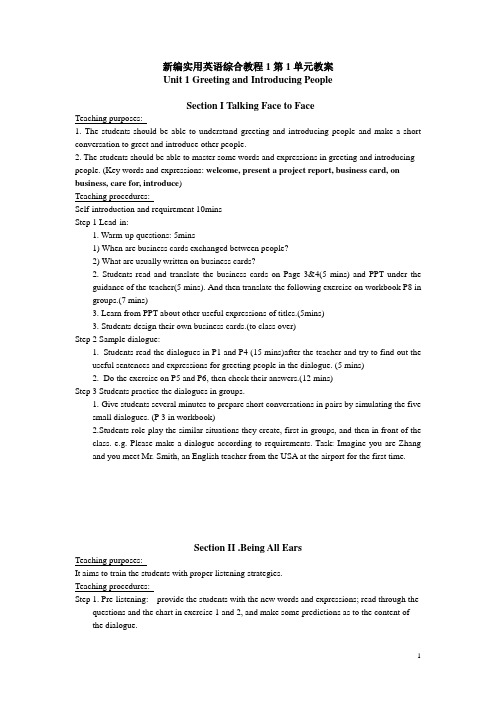
新编实用英语综合教程1第1单元教案Unit 1 Greeting and Introducing PeopleSection I Talking Face to FaceTeaching purposes:1. The students should be able to understand greeting and introducing people and make a short conversation to greet and introduce other people.2. The students should be able to master some words and expressions in greeting and introducing people. (Key words and expressions: welcome, present a project report, business card, on business, care for, introduce)Teaching procedures:Self-introduction and requirement 10minsStep 1 Lead-in:1. Warm-up questions: 5mins1) When are business cards exchanged between people?2) What are usually written on business cards?2. Students read and translate the business cards on Page 3&4(5 mins) and PPT under theguidance of the teacher(5 mins). And then translate the following exercise on workbook P8 in groups.(7 mins)3. Learn from PPT about other useful expressions of titles.(5mins)3. Students design their own business cards.(to class over)Step 2 Sample dialogue:1. Students read the dialogues in P1 and P4 (15 mins)after the teacher and try to find out theuseful sentences and expressions for greeting people in the dialogue. (5 mins)2. Do the exercise on P5 and P6, then check their answers.(12 mins)Step 3 Students practice the dialogues in groups.1.Give students several minutes to prepare short conversations in pairs by simulating the fivesmall dialogues. (P 3 in workbook)2.Students role-play the similar situations they create, first in groups, and then in front of theclass. e.g. Please make a dialogue according to requirements. Task: Imagine you are Zhang and you meet Mr. Smith, an English teacher from the USA at the airport for the first time.Section II .Being All EarsTeaching purposes:It aims to train the students with proper listening strategies.Teaching procedures:Step 1. Pre-listening: provide the students with the new words and expressions; read through the questions and the chart in exercise 1 and 2, and make some predictions as to the content of the dialogue.(Key words and expressions:1.Canada/The United States (of America) / the United Kingdom (of Great Britain andNorthern Ireland); England--Scotland--Welsh--Northern Ireland ;Britain;2.College3.Surprise surprise partyHis visit gave me a pleasant surprise. 他的来访使我感到惊喜。
新编大学实用英语教程教学案

教案课程名称大学英语1教案书写规范与要求一、以每次课为一个备课单元书写。
二、每一备课单元书写下列内容:1.周次、课次、授课时间、章节名称;2.简要说明:教学目的、重点、难点、教学方法和授课手段(包括与课程相关的上机和实验、课件制作等);3.教学主要内容(教案主体)及教学方法手段;4.作业内容。
注:其余授课电子版文件待本课程结束后,交教务处统一刻成光盘存档。
大学英语1 课程授课总体计划书厦门软件职业技术学院教案厦门软件职业技术学院教案厦门软件职业技术学院教案厦门软件职业技术学院教案厦门软件职业技术学院教案厦门软件职业技术学院教案2Working in pleasant __surroundings_(surround) is enjoyable.3His _patience_(patient) and kindness left a deep impression on me.4 After a few years of practice,he became very _skillful (skill) at skating.5 We are surprised at his great __improvement__(improve) in English.Activity 5 Fill in the blanks with the proper form of the words and phrases given in the box.1We got tired of his _endless_ boring speech.2 _Chatting_with friends is a good way of relaxation.3 Our country is rich in natural_resources__.4 Upon arrival,the singer are surrounded by a lot of fans and reporters.5 Tom _spends a lot of time in playing computer games every day.6To my surprise,only a third of the students in my class are interested in skiing. 7He seems so quiet,but _actually he likes talking.8These days all the college students are very busy,especially the seniors.9 I sent her a bunch of flowers as a (an) expression of gratitude.10 Our college offers an excellent art program .Step II Grammar代词(Pronouns)一代词的分类二代词的用法1 人称代词注意:(1)人称代词在比较分句中作主语,用主格;作宾语,用宾格,如:She works harder than I (do).她比我用功。
新编实用英语unit1教案
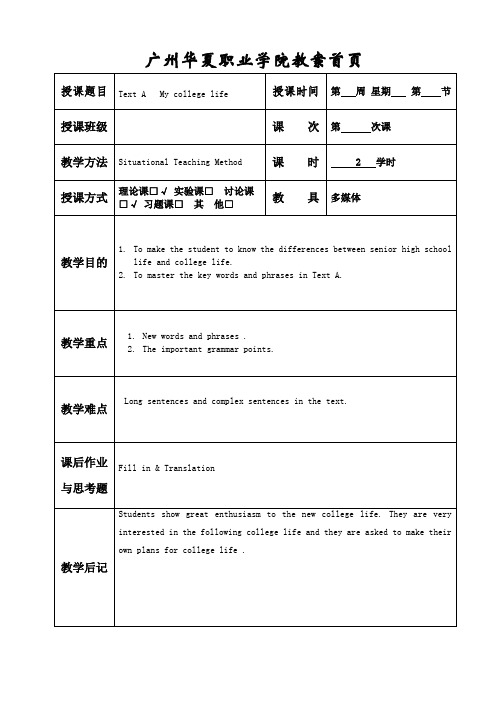
广州华夏职业学院教案首页广州华夏职业学院教案纸教学过程:(一 ) 新课导入教师通过多媒体展示新校园,新生军训照片,从而导入课堂主题——new life at college, 让学生发表来到新校园的感受与计划。
(二)讲授新课(1)New words1. Various 各种各样的. Various people said they had seen the accident. 许多人都说目睹了这次事故。
a variety of (多种的) = various (不同的, 各种各样的). There are a variety of animals in the zoo.=There are various animals in the zoo.2. Campus 校园3. Arouse 唤醒,引起4. Enthusiasm 热情,热衷的事物Enthusiastic (adj) 热心的,热情的. Enthusiasm is the lifeblood of creativity. 热情是创新的命根子。
5. Benefit 得益,受益1)用作名词。
利益;好处. It is said Yoga is of great benefit to human health. 据说瑜咖功对人体健康有极大好处。
2)用作动词。
(常与from, by连用)获益;得益于. The plants benefited from the rain. 植物得益于这场雨。
. We benefit from daily exercises. 我们得益于每天做操。
固定搭配:for the benefit of为了...的好处be of benefit to 对…有益6. Adapt 适应,改编固定搭配:adapt to 使适应,适应于. You must adapt to the norms in the society you live in. 在社会生活中就要遵循社会生活准则。
大学实用英语教程教案

大学实用英语教程教案文件排版存档编号:[UYTR-OUPT28-KBNTL98-UYNN208]教案课程名称大学英语1教案书写规范与要求一、以每次课为一个备课单元书写。
二、每一备课单元书写下列内容:1.周次、课次、授课时间、章节名称;2.简要说明:教学目的、重点、难点、教学方法和授课手段(包括与课程相关的上机和实验、课件制作等);3.教学主要内容(教案主体)及教学方法手段;4.作业内容。
注:其余授课电子版文件待本课程结束后,交教务处统一刻成光盘存档。
大学英语1 课程授课总体计划书厦门软件职业技术学院教案厦门软件职业技术学院教案厦门软件职业技术学院教案厦门软件职业技术学院教案厦门软件职业技术学院教案厦门软件职业技术学院教案厦门软件职业技术学院教案航空英语 English for Navigation 戏剧表演英语 English for Drama & Theatre英语写作 English Essays 英汉口译 Chinese-English Oral Interpretation英国文学史及选读 History of English Literature and Selected Readings 银行业及保险业英语 English for Banking & Insurance经济学、市场营销及会计学英语 English for Economics, Marketing & Accounting.Step II Listening & Speaking1 Listening to the two short conversations, guide students through the listening exercises, and summer up key expressions;2Listening to the two situational conversations, guide students through the listening exercises, and summer up key expressions;3 Learning the useful expressions.4 Doing oral exercises, guide students through these speaking exercises, let students practicing and performing the dialogues. Step III Writing名片,是各界人士在社会生活中通报姓名,介绍身份的卡片。
新编实用英语综合教程1教案
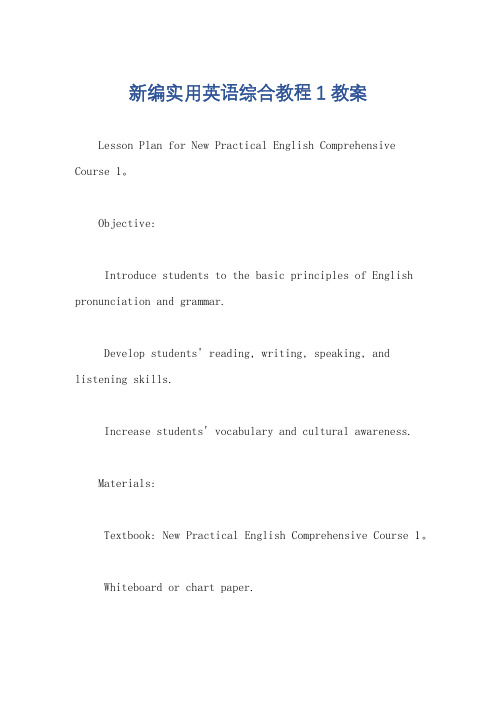
新编实用英语综合教程1教案Lesson Plan for New Practical English Comprehensive Course 1。
Objective:Introduce students to the basic principles of English pronunciation and grammar.Develop students' reading, writing, speaking, and listening skills.Increase students' vocabulary and cultural awareness.Materials:Textbook: New Practical English Comprehensive Course 1。
Whiteboard or chart paper.Markers.Audio-visual aids (optional)。
Procedure:1. Warm-up (5 minutes)。
Greet students and lead them in a few simple icebreakers to get them talking in English.Examples:Good morning/afternoon, class.How are you today?What is your name?2. Introduction (10 minutes)。
Explain the objective of the lesson and the importanceof learning English.Provide a brief overview of the topics covered in the textbook.Ask students to share their prior knowledge of English or any experiences they have had with the language.3. Lesson Development (45 minutes)。
新编实用英语英语教程第1册教案Unit1
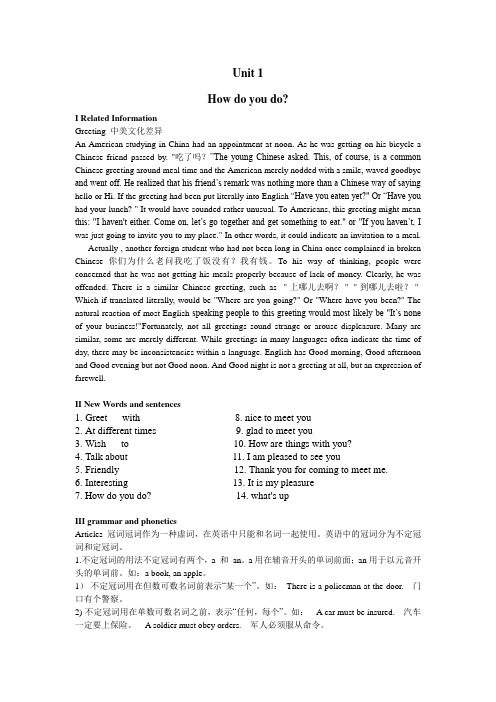
Unit 1How do you do?I Related InformationGreeting 中美文化差异An American studying in China had an appointment at noon. As he was getting on his bicycle a Chinese friend passed by. "吃了吗?”The young Chinese asked. This, of course, is a common Chinese greeting around meal time and the American merely nodded with a smile, waved goodbye and went off. He realized that his friend’s remark was nothing more than a Chinese way of saying hello or Hi. If the greeting had been put literally into English "Have you eaten yet?" Or “Have you had your lunch? " It would have sounded rather unusual. To Americans, this greeting might mean this: "I haven't either. Come on, let’s go together and get something to eat." or "If you haven’t, I was just going to invite you to my place." In other words, it could indicate an invitation to a meal.Actually , another foreign student who had not been long in China once complained in broken Chinese 你们为什么老问我吃了饭没有?我有钱。
新编大学英语1电子教案
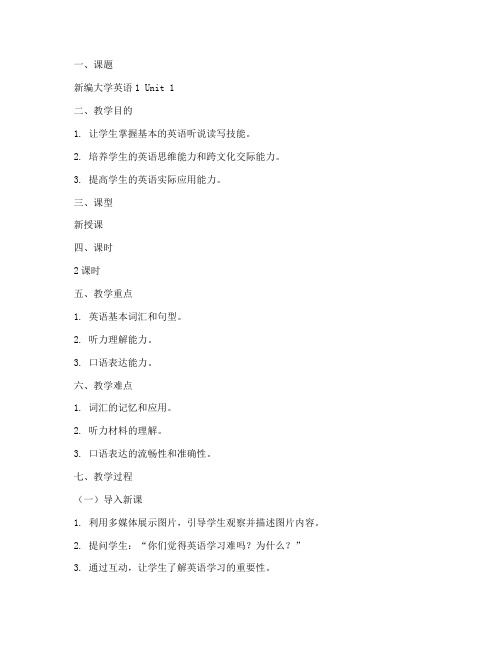
一、课题新编大学英语1 Unit 1二、教学目的1. 让学生掌握基本的英语听说读写技能。
2. 培养学生的英语思维能力和跨文化交际能力。
3. 提高学生的英语实际应用能力。
三、课型新授课四、课时2课时五、教学重点1. 英语基本词汇和句型。
2. 听力理解能力。
3. 口语表达能力。
六、教学难点1. 词汇的记忆和应用。
2. 听力材料的理解。
3. 口语表达的流畅性和准确性。
七、教学过程(一)导入新课1. 利用多媒体展示图片,引导学生观察并描述图片内容。
2. 提问学生:“你们觉得英语学习难吗?为什么?”3. 通过互动,让学生了解英语学习的重要性。
(二)讲授新课1. 词汇讲解:介绍本课重点词汇,并举例说明其用法。
2. 句型讲解:讲解本课重点句型,并进行示范。
3. 听力训练:播放听力材料,引导学生听并回答问题。
4. 口语练习:让学生分组进行口语练习,巩固所学知识。
(三)巩固练习1. 词汇练习:让学生根据所学词汇,进行填空、选择题等练习。
2. 句型练习:让学生根据所学句型,进行造句练习。
3. 听力练习:播放听力材料,让学生回答问题。
4. 口语练习:让学生进行角色扮演,巩固所学知识。
(四)归纳小结1. 总结本课所学内容,强调重点词汇和句型。
2. 鼓励学生在课后进行复习,巩固所学知识。
(五)作业布置1. 复习本课所学词汇和句型。
2. 完成课后练习题。
3. 收集有关英语学习的资料,进行阅读。
八、板书设计1. 课题:新编大学英语1 Unit 12. 重点词汇:example, importance, difficulty, etc.3. 重点句型:What do you think...? Why do you think so...?4. 教学步骤:导入新课、讲授新课、巩固练习、归纳小结、作业布置九、教具1. 多媒体设备:电脑、投影仪、音响等。
2. 听力材料:录音带、MP3等。
3. 教学课件:PPT等。
通过以上教学过程,使学生掌握新编大学英语1 Unit 1的基本知识,提高英语听说读写能力,为后续课程的学习打下坚实基础。
新编实用英语综合教程1一单元教案

Homework--- Ex. 5-6, P10.
计划布置 作
业
Ex.5, P10.
布
置
知识点
时间
10’
78’
2’
实际布置
Ex.5, P10.
课 后 自 评
2
教学提示
教案内容
备课内容(教学设计、知识点、课堂组织、教学方法等)
Unit One: Greeting and Introducing People (1)
课型
■ 理论 □ 讨论 □ 习题 □ 实验 □ 技能训练 □ 设计 □ 实习
授 授课班级 课 监理 1003/1104
时 地隧 1101/1102 间
周次 6 6
星期 6 6
节次 2 2
日期 2011/10/8 2011/10/8
教学效果
教 学 目 标 设 计
学 生 基 础 分 析
教 材 分 析
教 法 选 择
7. call 8. acquaint
课堂组织
Unit One: Passage 1
Difficult Sentences 1. The Way Americans Greet 2. Speaking of…time, I’ve got to run. 3. “Glad to meet you. I’m Miller. But call me Paul.” 4. But Americans do sometimes ask such questions. 5. In this way they can get better acquainted with you
湖北国土资源职业学院
教案
2011 - 2012 学年 第一学期
- 1、下载文档前请自行甄别文档内容的完整性,平台不提供额外的编辑、内容补充、找答案等附加服务。
- 2、"仅部分预览"的文档,不可在线预览部分如存在完整性等问题,可反馈申请退款(可完整预览的文档不适用该条件!)。
- 3、如文档侵犯您的权益,请联系客服反馈,我们会尽快为您处理(人工客服工作时间:9:00-18:30)。
教案课程名称大学英语1教案书写规范与要求一、以每次课为一个备课单元书写。
二、每一备课单元书写下列内容:1.周次、课次、授课时间、章节名称;2.简要说明:教学目的、重点、难点、教学方法和授课手段(包括与课程相关的上机和实验、课件制作等);3.教学主要内容(教案主体)及教学方法手段;4.作业内容。
注:其余授课电子版文件待本课程结束后,交教务处统一刻成光盘存档。
大学英语1 课程授课总体计划书成教学院教案成教学院教案成教学院教案成教学院教案5 We are surprised at his great __improvement__(improve) in English.Activity 5 Fill in the blanks with the proper form of the words and phrases given in the box.1We got tired of his _endless_ boring speech.2 _Chatting_with friends is a good way of relaxation.3 Our country is rich in natural_resources__.4 Upon arrival,the singer are surrounded by a lot of fans and reporters.5 Tom _spends a lot of time in playing computer games every day.6To my surprise,only a third of the students in my class are interested in skiing.7He seems so quiet,but _actually he likes talking.8These days all the college students are very busy,especially the seniors.9 I sent her a bunch of flowers as a (an) expression of gratitude.10 Our college offers an excellent art program .Step II Grammar代词(Pronouns)一代词的分类二代词的用法1 人称代词注意:(1)人称代词在比较分句中作主语,用主格;作宾语,用宾格,如:She works harder than I (do).她比我用功。
/ I love you more than him.我爱你甚于他。
(2)人称代词出现在动词be之后作表语,通常用宾格,如:—Who is it? 是谁?—It’s me.是我。
(3)当人称代词在强调句中被强调时,常用主格,如:It is he who should be responsible for the accident.正是他应该为此次意外负责2 物主代词注意:有时名词性物主代词有时和of连用,构成双重属格,表示部分概念,如:Mr.White is a teacher of mine.怀特先生是我的一个老师。
4指示代词注意:that/those 除作指示代词外,还可作替代词,即作为一种避免重复的手段,如:The climate in China is like that in America in many ways.中国的气候在很多方面和美国的气候相似。
The machines in our factory are better than those in your factory.我们工厂的机器质量比你们工厂的好。
6 不定代词常用不定代词的比较(1)every 和each(2)some和any(3)either,neither和both(4)the other,another 和others(5)none和no oneAnswers of ActivityB,D.C.D.C.A,B,C,B,CStep III Translation翻译中的增词法(Amplification)英译汉时,常常会根据意义上、修辞上或句法上的需要增加一些词,从而使译文更加忠实通顺地表达原文的思想内容。
通常,增词法的情况有以下两种。
一根据句法上的需要,把原文中省略的句子成分补充进去,使译文意思更加完整Some are not very good, but others are great.通过but 可以判断出,两个分句之间是转折关系。
英语中习惯用“but”表示“虽然(尽管)”与“但是”,以加强转折语气。
因此本句译为:“尽管有些网站不太好,但有些还是相当不错的。
”二根据意义上或修辞的需要增加词汇,如增加表示时态意义的词和不及物动词隐含的宾语意义的词等。
1 Slowly you can improve.improve作不及物动词,英语中有些动词有时用作及物动词,有时用作不及物动词。
当它用作不及物动词时,宾语实际上是隐含在动词后面的,因此译成汉语时常常需要把它表达出来。
根据上下文判断improve隐含的宾语应该是English level。
因此本句可以翻译为:慢慢地你也会提高自己的英语水平。
2 If you are always angry at how slowly you are learning, you will easily get discouraged.英译汉时,常常在形容词前增加名词。
本句中slowly表示“缓慢地”,是副词,根据上下文“慢”应该是形容“学习的进度”因此本句应翻译为:如果你经常因为学习的进度慢而生气,那么你会很容易感到灰心丧气。
”Step IV Homework1 Activity 6 of Text A2 Activity of Translation成教学院教案经济学、市场营销及会计学英语English for Economics, Marketing & Accounting.Step II Listening & Speaking1 Listening to the two short conversations, guide students through the listening exercises, and summer up key expressions;2Listening to the two situational conversations, guide students through the listening exercises, and summer up key expressions;3 Learning the useful expressions.4 Doing oral exercises, guide students through these speaking exercises, let students practicing and performing the dialogues.Step III Writing名片,是各界人士在社会生活中通报姓名,介绍身份的卡片。
在商务活动中,交换名片是一项很重要的活动。
在对外交流中,人们常常需要将自己的名片印上英文。
这就要求名片上的英文写法正确、规范,顺序符合英语规则。
Sample:The following is a business card.Please read and try to understand it.Guangzhou ABC Trade CompanyWang WeiGeneral ManagerAddress: No.** Dongfeng Road,Baiyun District ,GuangzhouTel:020-889977** Postal code: 510410Fax:020-889966** E-mail: wang**@从以上名片中我们可以看出名片通常包括以下内容:本人的工作单位(Employment organization):通常位于名片的正上方或左上角。
本人姓名(Name):位于名片的正中。
职位、职称或头衔(Title/position):位于名片的正中,姓名之下。
单位地址(Address):位于名片的下方。
(英文地址的下方请参考第一课的写作部分)邮政编码(Postal code):位于名片的下方。
有时直接写在城市或国名的后面。
电话号码(Telephone number):位于名片的下方。
由于移动电话的普及,名片中常常也要写出本人的移动电话号码,如:Mobile: 138112233**。
传真号码(Fax):位于名片的下方。
电子邮件地址(E-mail address):位于名片的下方。
注意:在英文中常用缩写Co.代表“公司”;Co.,Ltd.代表“有限公司”。
在书写名片时,通常先写地址,再写电话,传真等内容。
Supplementary knowledge of writing总裁/董事长总经理技术总监项目经理销售经理商务经理市场主管财务总监财务经理会计审计经理PresidentGeneral ManagerTechnical DirectorProject ManagerSales ManagerBusiness ManagerMarketing SupervisorFinance DirectorFinance ManagerAccountantAudit Manager证券经纪人投资顾问总工程师运营经理行政助理人事经理首席执行官物流经理编辑设计总监律师Stock BrokerInvestment AdvisorChief EngineerOperation ManagerExecutive AssistantHuman ResourcesManagerCEOLogistics ManagerEditorDesign DirectorLawyerBusiness card etiquette (名片礼仪)Business card etiquette is somewhat like dinner etiquette.When keeping your elbows off the table,the reward you hope for is an invitation back for another dinner.However,minding your business card manners can help you achieve successful business.Here are a few simple rules to keep in mind:Your business cards should be clean and up-to-date.Do not force your card on those who have not asked for it.Treat cards with respect when receiving them.Upon accepting a card,you have the opportunity to repeat the name and be corrected on pronunciation—to be corrected on pronunciation after this is a bit more of a gaffe(失礼).You should also ask any question that the card itself may bring to mind and comment on the design if practical.The idea is to show interest in any contact’s card,which will make them more likely to be interested in yours.Do not enclose business cards in personal or emotional correspondence.Wait until someone of higher rank asks for your card or a third party has introduced you. Write an English business card according to the Chinese information given below成教学院教案3 形容词性物主代词,只能作定语,与own连用表示强调,在句中可用作主语,动词宾语,介词短语和表语,在句中可用做主语,动词宾语,介词宾语和表语.(三)反身代词1作动词宾语The bus is going. Please seat yourselves.2作介词宾语He is very selfish, and he always thinks of himself.3作同位语The dress itself is good, but I don't think it suits me.4用于固定习语中The computer turned off of itself.(四)few, a few,little, a little的用法(五)plenty of, a lot of 和lots of的用法plenty of, a lot of 和lots of + 复数可数名词或单数不可数名词,一般用在肯定句中,也可以用在疑问句中,尤其当期望得到肯定的答复时(六)引导强调句1 It is/was + 被强调的部分(某人)+who(whom)+其他2 It is/was +被强调的部分(非某人)+that +其他选择is,was要看主要动词的时态,主要动词如果是与在有关的时态,那么用is;主要动词如果是用过去有关的时态,那么用was。
